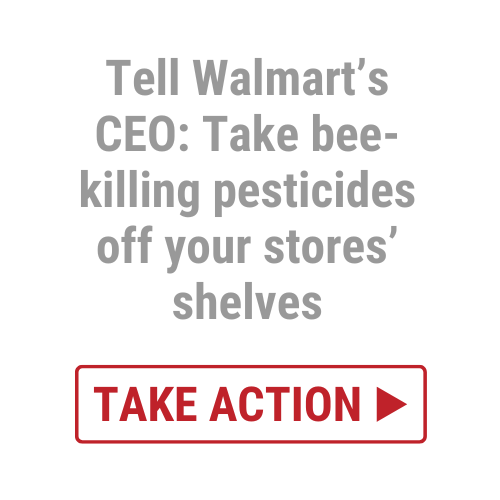
 |
John,
The reckless use of certain toxic pesticides is sending multiple bee species into rapid decline, threatening an essential function of our food system.1
To its credit, Walmart is encouraging its fresh produce suppliers to phase out the use of pesticides known to harm bees.2
And yet, Walmart sells these same bee-killing pesticides in its retail stores, risking more death among bees and other pollinators.3
Tell Walmart: Stop selling toxic bee-killing pesticides.
As any gardener knows, bees are essential for pollinating plants that provide food -- in fact, more than 70 of the 100 crops that provide 90% of the world's food. But the pesticides being used on plants are causing serious problems for bees.4
Bees' exposure to a class of pesticides called neonicotinoids, or neonics for short, can cause permanent damage to their brains, weaken their immune systems, and harm their ability to navigate to their hives.5
If we lose the bees, we lose their ability to pollinate the foods we love. Melons, apples, broccoli and squash, just to name a few crops, are all pollinated by bees.6
Despite the risks, around 4 million pounds of these bee-killing pesticides are used on cropland across the country every year.7 And they can end up in soil and stay actively toxic for years, traveling far and wide to other plants through rainwater and irrigation systems.8
Join us in calling on Walmart to get these toxic pesticides that harm bees off its shelves.
Widespread use of these pesticides makes even less sense when you consider the possible risks to human health. Chronic exposure to neonicotinoids has been shown to have adverse effects on human development and brain function.9
Walmart is taking action to reduce or eliminate the use of bee-killing pesticides in its produce supply. Why is the company still selling these pesticides to the public?
A public commitment from Walmart to stop selling toxic bee-killing pesticides could make a big difference -- leading the way for other retailers to do the same and keeping these pesticides from harming bees.
We need all hands on deck to protect our health, our food and the vital pollinators that we depend on for both.
Take action by adding your name today.
Thank you,
Faye Park
President
1. "Why bees are essential to people and planet," United Nations Environmental Programme, May 18, 2022.
2. "Restoring Pollinator Habitats is Key to Feeding the Future," Walmart, April 13, 2021.
3. "Quali-Pro Imidacloprid T&O 2F Insecticide (Generic Merit)" Walmart, last accessed August 24, 2023.
4. "#FridayFact: One in three spoonfuls of food depends on bees!" United Nations Environmental Programme, May 18, 2018.
5. Aleksandra Leska, et al. "Effects of Insecticides and Microbiological Contaminants on Apis mellifera Health" August 22, 2021.
6. "Helping Agriculture's Helpful Honey Bees," U.S. Food & Drug Administration, July 30, 2018.
7. Andria Cimino et al. "Effects of Neonicotinoid Pesticide Exposure on Human Health: A Systematic Review" July 6, 2016.
8. Dan Raichel, "Another Voice: Neonics are causing great harm to pollinators and humans," The Buffalo News, May 29, 2023.
9. Andria Cimino et al. "Effects of Neonicotinoid Pesticide Exposure on Human Health: A Systematic Review" July 6, 2016.
Support U.S. PIRG. Contributions by people just like you make our advocacy possible. Your contribution supports a staff of organizers, attorneys, scientists and other professionals who monitor government and corporate decisions and advocate on the public's behalf.
Join us on Facebook | Follow us on Twitter
U.S. PIRG, Main Office: 1543 Wazee St., Suite 460, Denver, CO 80202, (303) 801-0582
Federal Advocacy Office: 600 Pennsylvania Ave. SE, 4th Fl., Washington, DC 20003, (202) 546-9707
Member Questions or Requests: 1-800-838-6554.
If you want us to stop sending you email then follow this link -- unsubscribe.